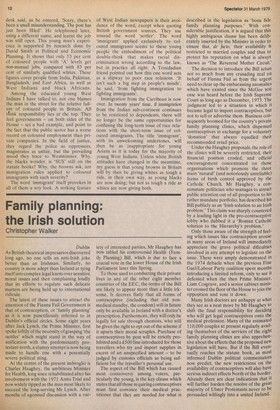Family planning: the Irish solution
Christopher Walker
Dublin As British theatrical impresarios discovered long ago, no one tells an anti-Irish joke better than an Irishman: Similarly, no country is more adept than Ireland at tying itself into complex legal knots over sensitive moral issues and then complaining loudly that its efforts to regulate such delicate matters are being held up to international ridicule.
The latest of these issues to attract the attention of the Fianna Fail Government is that of contraception, or 'family planning' as it is now punctiliously referred to in Dublin's official circles. Some eight years after Jack Lynch, the Prime Minister, first spoke loftily of the necessity of grasping 'the nettles' which might stand in the way of unification with the predominantly protestant north, a clumsy attempt is now being made to handle one with a potentially severe political sting.
At the centre of the present imbroglio is Charles Haughey, the ambitious Minister for Health, long since rehabilitated after his involvement with the 1971 Arms Trial and now widely tipped as the man most likely to succeed the long-serving Mr Lynch. After months of agonised discussion with a var iety of interested parties, Mr Haughey has now tabled his controversial Health (Family Planning) Bill, which is due to face a crucial vote in the lower House of the Irish Parliament later this Spring.
To those used to conducting their private lives in any of the other eight member countries of the EEC, the terms of the Bill are likely to appear more than a little irksome. It decrees flatly that all forms of contraceptive (including that old nonmedical standby, the condom) will in future only be available in Ireland with a doctor's prescription. Furthermore, they will only be legally for sale through chemists, 'who will be given the right to opt out of the scheme if it upsets their moral scruples. Purchase of contraceptives by post will be strictly prohibited and a £500 fine introduced for those travellers who try and import supplies in excess of an unspecified amount — to be judged by customs officials as being sufficient for the traveller's personal use.
The aspect of the Bill which has caused most controversy among voters, particularly the young, is the key clause which states that all those requiring contraceptives must first convince their medical practitioner that they are needed for what is described in the legislation as 'bona fide family planning purposes.' With considerable justification, it is argued that this highly ambiguous clause has been deliberately inserted by the Minister in order to ensure that, de facto, their availability is restricted to married couples and thus to protect his reputation on what is always known as 'The Reverend Mother Circuit.'
The decision to introduce the Bill arises not so much from any crusading zeal on behalf of Fianna Fail as from the urgent need to clear up the embarassing anomalies which have existed since the McGee test case was heard before the Irish Supreme Court as long ago as December, 1973. The judgment led to a situation in which it became legal to import contraceptives, but not to sell or advertise them. Business consequently boomed for the country's private family planning clinics, which dispensed contraceptives in exchange for a voluntary 'donation' that always equalled their recommended retail price. Under the Haughey proposals, the role of the clinics will be severely restricted, their financial position eroded, and official encouragement concentrated on those organisations which promote the three main 'natural' (and notoriously unreliable) forms of birth control approved by the Catholic Church. Mr Haughey, a consummate politician who manages to attract public attention out of all proportion to his rather mundane portfolio, has described his Bill publicly as an 'Irish solution to an Irish problem.' This claim was sharply countered by a leading light in the pro-contraceptive lobby who dubbed it a 'Roman Catholic solution to the Hierarchy's problem.'
Only those aware of the strength of feeling which issues like contraception arouse in many areas of Ireland will immediately appreciate the grave political dificulties involved in any attempt to legislate on the issue. These were amply demonstrated in the 1974 debacle when the previous Fine Gael/Labour Party coalition spent months introducing a limited reform, only to see it defeated when the then Prime Minister, Liam Cosgrave, and a senior cabinet minister crossed the floor of the House to join the opposition and vote it down.
Many Irish doctors are unhappy at what they see as a neat move by Mr Haughey to shift the final responsibility for deciding who will get legal contraceptives onto the medical profession. Many of the estimated 110,000 couples at present regularly availing themselves of the services of the eight family planning clinics are also apprehensive about the effects that the proposed new legislation will have. But if the Bill eventually reaches the statute book, as most informed Dublin political commentators now predict, the new restrictions on the availability of contraceptives will also have serious indirect effects North of the border. Already there are clear indications that it will further harden the resolve of the great majority of Ulster Protestants never to be persuaded willingly into a united Ireland.






































 Previous page
Previous page